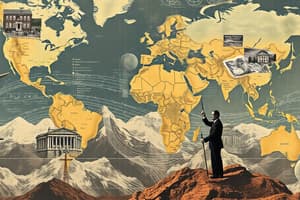Podcast
Questions and Answers
Which of the following accurately describes Alfred Wegener's academic background before he formulated his continental drift theory?
Which of the following accurately describes Alfred Wegener's academic background before he formulated his continental drift theory?
- Studied geology at Berlin University before transitioning to meteorology.
- Earned a PhD in meteorology at Marburg University.
- Completed a doctoral degree in geophysics, influencing his continental studies.
- Received a PhD in astronomy, then shifted focus to meteorology. (correct)
What significant scientific endeavor did Wegener undertake with his brother Kurt in 1906?
What significant scientific endeavor did Wegener undertake with his brother Kurt in 1906?
- Developing new geological surveying techniques.
- Initiating the first geological survey of Africa's east coast.
- Utilizing weather balloons to study atmospheric conditions. (correct)
- Pioneering magnetic field mapping in Greenland.
What prompted Alfred Wegener to begin questioning the formation of continents while at Marburg University?
What prompted Alfred Wegener to begin questioning the formation of continents while at Marburg University?
- Noticing that coastlines of continents appeared to fit together. (correct)
- Analyzing new geological data from his expeditions.
- Discovering unique climate patterns that connected distant lands.
- Witnessing unexplained seismic activities in Greenland.
Which critical piece of evidence did Wegener discover in 1911 that supported his theory?
Which critical piece of evidence did Wegener discover in 1911 that supported his theory?
Which event interrupted Wegener's academic work soon after his key publications in 1912?
Which event interrupted Wegener's academic work soon after his key publications in 1912?
In which publication did Wegener present maps illustrating how continents were once joined?
In which publication did Wegener present maps illustrating how continents were once joined?
What was the main goal of Wegener's final expedition to Greenland in 1930?
What was the main goal of Wegener's final expedition to Greenland in 1930?
Which position did Alfred Wegener are not be held at any point during his career?
Which position did Alfred Wegener are not be held at any point during his career?
In what unconventional academic field was Wegener initially educated?
In what unconventional academic field was Wegener initially educated?
What aspect of Wegener's career illustrates his pioneer spirit, predating widespread acceptance?
What aspect of Wegener's career illustrates his pioneer spirit, predating widespread acceptance?
Flashcards
Alfred Wegener
Alfred Wegener
A meteorologist and Arctic explorer known for proposing continental drift theory.
Continental Drift
Continental Drift
The theory that continents were once joined and have drifted apart over time.
Fossil Evidence
Fossil Evidence
Fossils discovered that supported the connection between Africa and South America.
Weather Balloons
Weather Balloons
Signup and view all the flashcards
Greenland Expedition
Greenland Expedition
Signup and view all the flashcards
The Origin of Continents and Oceans
The Origin of Continents and Oceans
Signup and view all the flashcards
Marburg University
Marburg University
Signup and view all the flashcards
Drafted into WWI
Drafted into WWI
Signup and view all the flashcards
Career Interrupted
Career Interrupted
Signup and view all the flashcards
Fourth Greenland Expedition
Fourth Greenland Expedition
Signup and view all the flashcards
Study Notes
Alfred Wegener: Meteorologist and Explorer
- Wegener, a meteorologist and Arctic explorer, was the first to propose a systematic theory of continental drift
- Despite not having a geology background, he gathered evidence from various research areas
- His ideas were initially not widely accepted, but later gained recognition
- Born in Berlin, Germany, youngest of five children
- Earned a PhD in astronomy at Berlin University, then switched to meteorology
- Worked at a meteorological station, where he pioneered the use of weather balloons to study air movement with his brother
- Led expeditions to Greenland in 1906, an experience leading to his first Greenland meteorological station, and later questioned why continents have their current shapes; noticed similarities in coastlines
- Became a professor of meteorology at Marburg University
- His fourth Greenland expedition in 1930 ended tragically; he did not return
- Wegener published a paper in 1912 introducing his theory of continental drift, and a book in 1915 called "The Origin of Continents and Oceans" which included maps of the theory
- Wegener's theory was supported by fossil evidence indicating that Africa and South America were connected in the past
Wegener's Career & Notable Accomplishments
- He discovered fossil evidence in 1911, supporting his theory that Africa and South America were joined
- Published his continental drift theory in two papers in 1912 and explained it in lectures
- Drafted into the German army during World War I, but was released in 1914 after being wounded
- In 1924, he took the position of professor of meteorology and geophysics at Graz University, Austria
Studying That Suits You
Use AI to generate personalized quizzes and flashcards to suit your learning preferences.





